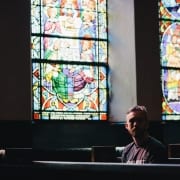Blessed Assurance
Blessèd assurance, Jesus is mine!
O what a foretaste of glory divine!
Heir of salvation, purchase of God,
Born of His Spirit, washed in His blood.
This is my story, this is my song,
Praising my Savior, all the day long;
This is my story, this is my song,
Praising my Savior, all the day long.
FANNY CROSBY, A BLIND SERVANT OF GOD
The song Blessed Assurance is one of the most popular songs in Christian Hymnals. Written in 1873 and first sung in churches the same year. The hymn was inspired by the life of the Apostle Paul and his steady faith and his work. The hymn was written by Fanny Crosby, the world’s most published hymn writer and who was blind.
Shortly after birth, Fanny caught a cold that settled in her eyes. Her parents took her to a doctor, who applied a mustard base ointment. It did not cure the affliction, but damaged Fanny’s optic nerve, leaving her blind. Later the doctor was discovered to be a quack and was banished from practicing medicine.
However, her blindness did not leave her helpless. She went on to become the most prolific hymn writer in America and the world. She wrote over 9,000 hymns. The most famous being “Blessed Assurance.”
She lived from 1820 to 1915. From the age of 23 to her death, she knew and spoke with every American president. She spoke in front of congress numerous times, urging for the support of the blind. In fact, she became the first woman to speak in front of the U.S. Senate, at the age of 23.
Crosby wrote over 9,000 hymns during her lifetime. Her publishers paid her $1 to $2 a song. While her publishers only requested 3 to 4 songs a week, Fanny wrote 6 or 7 a day. She was so prolific some denominations asked her to use a pseudo name, to ensure their hymnals didn’t appear to be written by one composer.
Fanny’s songs are in every denominations hymnal’s. While a life-long member of the 6th Avenue Bible Baptist church in Brooklyn, she also attended many different denominations. Believing she was a Christian first and not denominationally directed.
When Fanny began any hymn composition, she prayed for direction. She was also inspired by people she met during her day. For example, she came across a prisoner being sent to jail and heard him say, “O Lord, don’t pass me by.” This meeting created the song, Pass me not, O gentle Savior.
Today, Fanny isn’t a household name, but in her day she was one of the America’s most influential people. She openly communicated with presidents and members of Congress.
Many times people expressed sympathy for her blindness. Her response was, “Do you know that if at birth I had been able to make one petition, it would have been that I was born blind?” When asked why she would say this her reply was, “Because when I get to heaven, the first face that shall ever gladden my sight will be that of my Savior.”
Fanny memorized the entire Bible. As a child she learned five chapters a week. As a child she could recite, Proverbs, the Psalms and the entire Gospel. Every day of every week, she made the study of the Bible her goal.
As an adult she taught at the New York Institute for the Blind. She spent 11 years teaching, only to leave to pursue her writing career. But remained a lifelong benefactor of the school.
Fanny died in 1915 at the age of 95. She left a legacy of Christian commitment and service. “You will reach the river brink, some sweet day, bye and bye,” was her last written stanza.
Blessings, until next time,
Bruce L. Hartman
Photo by ANDI WHISKEY
We love giving credit to budding photographers to help them gain more exposure.









